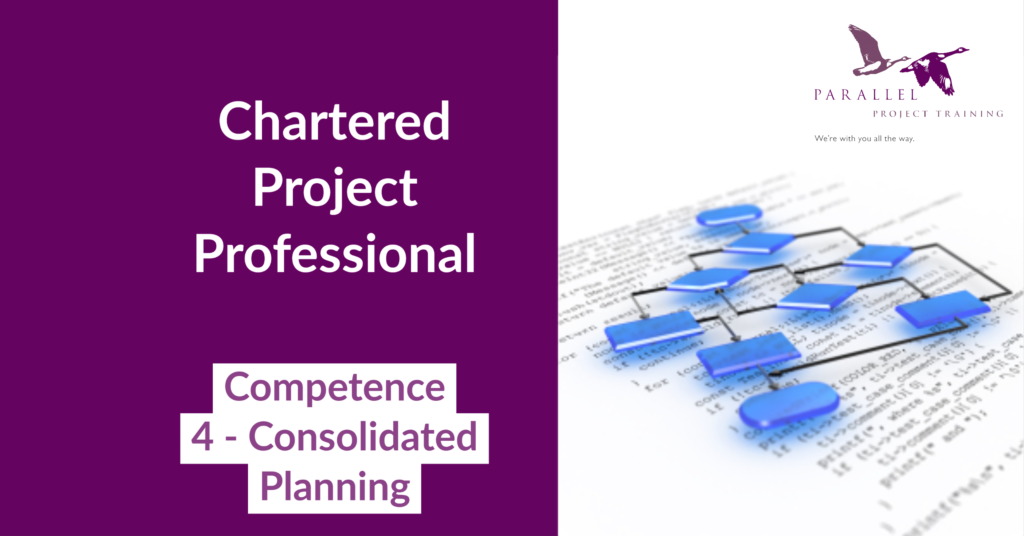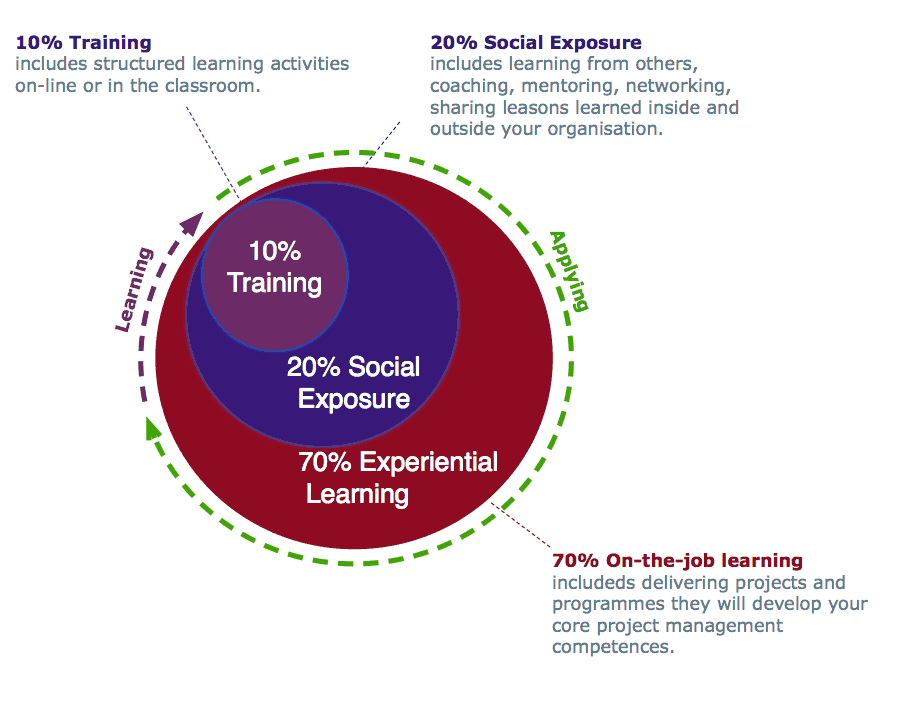So you have completed the APM PMQ Project Management Qualification and are considering the next steps for progressing your career as a project professional.
Two of the questions I often get asked are:
- I have successfully passed my APM Project Management Qualification (APM PMQ) what is the next step?
- How do I work towards becoming a APM Chartered Project Professional?
So you have successfully completed and passed your APM PMQ what next? How can you develop the competencies not only to develop your professional standing but develop the knowledge, skills, behaviours of a professional project manager?

What is Consolidated planning?
Well, it’s not all about booking the next training course, I suggest the next step is to apply some of what you have learned. It’s useful to think about the 70-20-10 model here (Lombardo, Michael M; Eichinger, Robert W (1996). The Career Architect Development Planner (1st ed.). Minneapolis: Lominger. p. iv. ISBN 0-9655712-1-1.)
 Set a Goal?
Set a Goal?
Before working in any self-development it is always worth setting your self a goal. This needed be a long-term life-changing mission, it can as simple as reflecting on where you are and where you would like to be in the short term. Is project management the right career for you and what sorts of projects do you like to get involves in. Is project management just part of your role or do you see project management as your future profession? It may be worth reading my other blog posts on is a career in project management right for me, as part of this review. If you decide professional project management is for you then you need to plan your next step. This is where the 70-20-10 model is useful in helping you to apply what you have learned.
End Goal
Before moving on it is worth pausing to consider Chartered Project Professional as one possible end goal. Ultimately as professional project managers, we want to deliver successful projects for our organisations and customers; or more realistically increase the chances of projects being successful. To do this we rely on our skills, knowledge and experience to influence the planning and control of project across the lifecycle. The APM has defined the core competencies it would expect to see in a Chartered Project Professional as:
Mandatory competencesEvidence needed for all 10 |
Elective competencesEvidence needed for two |
Team managementThe ability to select, develop and manage teams. |
ProcurementThe ability to secure provision of resources needed for change initiative(s) from internal and/or external providers. |
Conflict managementThe ability to identify, address and resolve differences between individuals and/or interest groups. |
Contract managementThe ability to agree contracts for the provision of goods and/or services, to monitor compliance and to manage variances. |
LeadershipThe ability to empower and inspire others to deliver successful change initiatives. |
Requirements managementThe ability to prepare and maintain definitions of the requirements of change initiatives. |
Risk, opportunity and issue managementThe ability to identify and monitor risks (threats and opportunities), to plan and implement responses to those risks, and to respond to other issues that affect the change initiative. |
Solutions developmentThe ability to determine the best means of satisfying requirements within the context of the change initiative’s objectives and constraints. |
Consolidated planningThe ability to consolidate and document the fundamental components of a change initiative: scope; schedule; resource requirements; budgets; risks; opportunities and issues; and quality requirements. |
Schedule managementThe ability to prepare and maintain schedules for activities and events for change initiatives, taking account of dependencies and resource requirements. |
Governance arrangementsThe ability to establish and maintain governance structures that define clear roles, responsibilities and accountabilities for governance and delivery of change initiatives, and that align with organisational practice. |
Resource managementThe ability to develop, implement and update resource allocation plans (other than finance) for change initiatives, taking account of availabilities and scheduling. |
Stakeholder and communications managementThe ability to manage stakeholders, taking account of their levels of influence and particular interests. |
Quality managementThe ability to develop, maintain and apply quality management processes for change initiative activities and outputs. |
ReviewsThe ability to establish and manage reviews at appropriate points, during and after change initiatives, which will inform governance of the change initiatives, by providing evaluations of progress, methodologies and continuing relevance. |
Transition managementThe ability to manage the integration of the outputs of change initiatives into business as usual, addressing the readiness of users, compatibility of work systems and the realisation of benefits. |
Change controlThe ability to establish protocols to alter the scope of change initiatives, implementing the protocols when necessary, and updating configuration documentation, including contracts to develop, maintain and apply quality management processes for change initiative activities and outputs. |
Resource capacity planningThe ability to prepare and maintain an overall schedule for resource use in related change initiatives, which avoids bottlenecks and conflicting demands, and which sequences outcomes in order to enable the efficient realisation of benefits. |
Budgeting and cost controlThe ability to develop and agree budgets for change initiatives, and to control forecast and actual costs against the budget. Financial managementThe ability to plan and control the finances of programmes or portfolios and their related change initiatives, as a means of driving performance and as part of the organisation’s overall financial management. |
Frameworks and methodologiesThe ability to identify and/or develop frameworks and methodologies that will ensure management of change initiatives will be comprehensive and consistent across different initiatives. (In this context, ‘framework’ means the parameters, constraints or rules established to standardise delivery.) |
Independent assuranceThe ability to gather independent evidence that the information from the change initiative is valid, and that the change initiative is likely to achieve its aims. |
So if you see project management as your profession then you should consider working towards Chartered Project Professional. In planning your development, you need to consider how you will grow these competencies. How will you gain experience managing difficult stakeholders? How can you get experience planning and controlling the budget of complex projects? How will you implement effective change control processes? To achieve the chartered status it is not enough to understand these topics you also need to know how to put them into practice. This is where the 70-20-10 learning model can help.
70-20-10 Leaning Model
The 70-20-10 model describes how 70% of what we learn comes from experiential learning. For you, this means delivering stretching, but not impossible, projects. At the start of your career, this may be just a work package within an overall project. As your competence and confidence grow when you have completed the APM PMQ you can grow your responsibility. Taking on larger and more complex work packages or projects. The important thing is that you take ownership and accountability for delivery. Influencing the decision making processes of others. You are not just a project coordinator or communication interface between the different parties. You should seek out opportunities to take on these responsibilities, testing our new ways of working. Adapting and improving the way you manage projects as you go.
In our experience, many project managers have their own project controls system to complement corporate systems. They may operate a contract tracker to recorded commitments or used tried and tested reporting processes. For example, one project manager used a simple PowerPoint pack for reporting. Every month each work package manager would present three slides covered work done this month, work planned next month and then a final slide summarising any key risk, issues and changes.
If you plan to eventually apply for chartered project professional it’s important that you establish and get into the habit of maintaining a CPD log. This shouldn’t just be a random set of learning events but should be clearly structured around your personal development needs. We would recommend using the headings from the competence model as a guide. Recording your CPD and experience under these headings will make life so much easier once the time comes to make you Chartered Project Professional application.
20% Social Learning Helps Deliver Success
This is where social learning can help you achieve your goals. Develop a network of project managers and other specialists. Learn from those who have more experience. Often your fellow PM are willing to share what they have learned from previous projects. Develop a network of people you respect and trust. The Association for Project Management offers plenty of opportunities to network with people outside your current employer. With branch events in most regions and specialist interest groups in areas such as risk management and project assurance.
One of the challenges in the project environment is that each project has a temporary team and you have little time to get to know the people on your team. One strategy I have seen many successful PM use is to develop a core team of people you trust, who you can work with on multiple projects. Some people see this as a bit of a clique, but its a strategy I have seen successful project managers use again and again.
10% Formal Training
Once you have the experience and developed your network then its now time to formalise your status with a formal qualification. The APM has identified three routes to chartered status. These are
- Route one: For project professionals who have a recognised assessment for technical knowledge.
- Route two: For project professionals who have a recognised assessment for technical knowledge and professional practice
- Route three: An experiential route for project professionals who do not have a recognised assessment, but do meet the eligibility requirements.
For each route, you will need to demonstrate
- Demonstrate advanced technical knowledge of the necessary competencies. (As yet we are awaiting the APM work on defining what these qualifications are)
- Demonstrate practical application of the necessary competencies.
- Provide two proposers to support your application.
- Demonstrate a structured approach to CPD over the least 12 months.
- Commit to the APM’s Code of Professional Conduct.
- Provide evidence of working in an ethical way.
We are expecting further details for the routes in the near future, and we will update this post as soon as this information is available. So for example we don’t know how significant the APM PMQ will be in this process.
 Set a Goal?
Set a Goal?